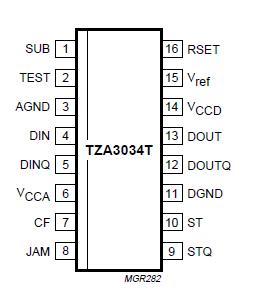TZA3034T: Features: · Pin compatible with the NE/SA5224 and NE/SA5225 but with extended power supply range and less external component count· Wideband operation from 1.0 kHz to 150 MHz typical· Applicable in ...
floor Price/Ceiling Price
- Part Number:
- TZA3034T
- Supply Ability:
- 5000
Price Break
- Qty
- 1~5000
- Unit Price
- Negotiable
- Processing time
- 15 Days
SeekIC Buyer Protection PLUS - newly updated for 2013!
- Escrow Protection.
- Guaranteed refunds.
- Secure payments.
- Learn more >>
Month Sales
268 Transactions
Payment Methods
All payment methods are secure and covered by SeekIC Buyer Protection PLUS.

 TZA3034T Data Sheet
TZA3034T Data Sheet







